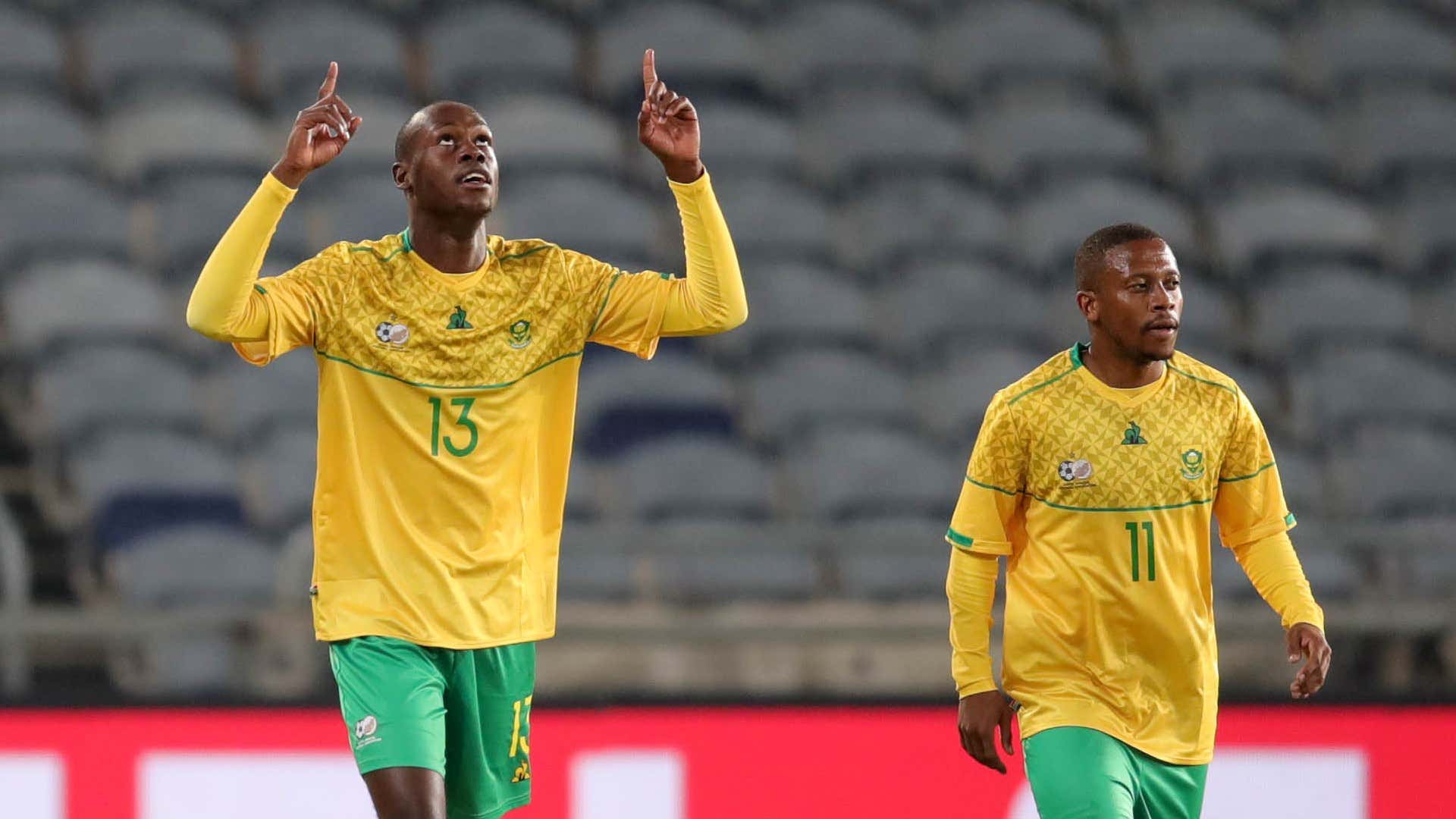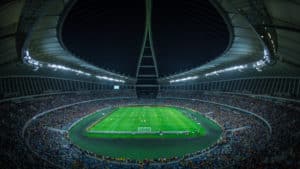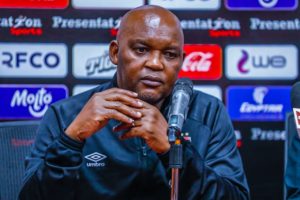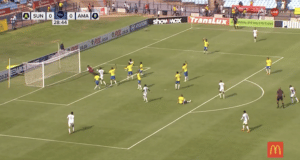Bafana Bafana and Baroka FC forward Evidence Makgopa has revealed that he never dreamed of making it as a professional footballer growing up in a village in Limpopo.
Twelve-year-old Evidence had only one thing on his mind and that was school work, although he carried a clipboard with newspaper clippings of Cristiano Ronaldo and Zlatan Ibrahimovic on his 10-km trip to school.
Makgopa continued to idolise Ronaldo and Ibrahimovic as he dreamed about leaving behind the dusty roads of Limpopo. But, playing the game for the first time at 13, he was discovered by Baroka during a village tournament when he played defender.
Since then, Makgopa has forced his way in Bakgaga’s first team and managed to score 14 goals and five assists in 48 appearances as well as representing South Africa at the Olympics and Bafana Bafana at the Fifa World Cup qualifiers.
Makgopa recently had a chat with Fifa.com about his performance for Baroka and also how he managed to earn a spot in the national team set-up ahead of their qualifiers against Zimbabwe and Ghana.
Fifa.com: You started playing football quite late, right?
Makgopa: I didn’t really play football until I was 13. I played street football, but I never played in a match. My life was dedicated to school. I studied every day, including Saturday and Sunday, and had to walk over 10 km to get to school and over 10 km to get home. And when I did have time, I was paranoid that I would play in a game and make a mistake, so I just stuck to kicking a ball on the streets. Then, when I was 13, someone spotted me playing street football and said, ‘This boy can play’. Then I started playing in matches for the first time in my village. I played as a defender, but people didn’t really have positions. It was just everyone chasing after the ball, it was just for fun. The pitches were extremely difficult to play on. They were very dusty, there was no soft ground.
During those long walks to school did you fantasise about becoming a footballer?
No. That was too unrealistic to even dream about for someone from my village. Growing up in a small, rural area, you don’t really think about making it in life, yet alone football. I had a file for school and I filled it with newspaper clippings about footballers. I used to look at them as I walked to school and think, ‘How good must it be to be that player? He must have an amazing life’. But dreaming about doing what he was doing was too unrealistic. If you had told me then I would become a professional footballer I would have thought you were completely crazy.
Baroka saw you by chance playing at the back in a village tournament in December 2018. Is it true that you didn’t think you were good enough when they approached you afterwards?
When I first heard I was like, ‘OK’ (surprised voice). My dream was to make it in life. This was something out of a crazy dream. I didn’t think I was good enough to become a professional footballer. I had a lot of doubts. But then I said to myself, ‘I can’t let this opportunity go. I have to give it everything’.
Within a few years you had come off the bench and scored two goals to secure a 3-2 win on your Bafana Bafana debut …
It was unbelievable. I only played professional football for the first time 15 months earlier and there I was representing Bafana Bafana. I was really, really nervous beforehand, but I said to myself, ‘Get your head down, be humble, work hard, you know you can do this.’ Fortunately everything went according to plan. I scored a brace and we won. I realised a dream that day. I remember having a video call with my family after the game. My mum is someone who is always texting me. When we lose, she always tries to pick me up, tells me next time I’ll score and we’ll win. And when we win, she’s always praising me. I remember seeing how proud she was and that meant so much to me.
How did you feel when you were called up to go to the Olympics?
Is this really happening? I remember getting on the plane and still thinking the same. I have made my debut for Bafana Bafana and now I’m about to become an Olympian. Things like this don’t happen to people like me. When am I going to wake up? But I also wanted to give absolutely everything I had to justify this incredible opportunity. Someone had believed in me, given me a chance, perhaps over an experienced player. I was very grateful and I wanted to repay that.
South Africa went out having lost all three games, but on an individual level you shone. Are you proud of your performances?
Yeah, I can say that I’m proud of my performances, especially the game against France. I scored a goal, I hit the post and I feel I got the better of their defenders. It was a great experience. You think about all the great players who have played in the Olympics, all the great athletes from other sports, and it makes the feeling of being an Olympian really something.
How would you describe yourself as a player?
I think my biggest qualities are my finishing, my aerial game and my movement. From where I come from, I knew it was going to be really difficult for me to make it, so I knew I had to go that extra mile. So I started studying players off YouTube and I think this has really helped me. Since I started playing as a striker, I’ve been studying Edinson Cavani, Zlatan Ibrahimovic, Tammy Abraham, Cristiano Ronaldo, Romelu Lukaku, Lebo Mothiba. For movement, I have learned a lot from Cavani. For technique, Ibrahimovic. For protecting the ball, Mothiba. I still study players on YouTube. It has helped me a lot.
A lot of South Africa’s biggest prospects in recent decades have been criticised for being very lazy, but you’re renowned for your excellent work rate. Do you make a conscious effort to work your socks off?
Yes, and in every single game. I know that there may be a striker who is faster than me, more skilful, a better finisher, and I can’t do anything about that. But I can control if I work harder than him, and I make absolutely sure that I do. I never want to give a coach, in any game throughout my career, the opportunity to criticise my work rate. I would rather die on the pitch.
Ghana have Thomas Partey of Arsenal, Mohammed Kudus of Ajax, Kamaldeen Sulemana of Rennes, the Ayew brothers. They were the big favourites to win Group G, but South Africa are currently one point clear at the top …
Football’s full of surprises. Yes, they have players from big clubs in Europe, but we don’t care who they are. We really want to be in Qatar next year, and we see them as players in our way to that. So we have to raise our game, to fight. I’m very confident South Africa will finish first in our group. 2010 was incredible for South Africa, but then we missed the last two World Cups.
You turned 10 just before the 2010 World Cup. What do you remember from that tournament?
I will never forget Tshabalala scoring the first goal of the tournament. What a moment for South Africa. There was huge joy all over the country. It was the goal that made all South Africans believe. I was watching it with my whole family. There was a big screen in a park. Everyone was going crazy.
What would it mean to the people of South Africa to qualify for the World Cup again?
I can’t even begin to imagine what it would mean. South African people are very passionate about football. It’s very personal to them. They will come up to you and criticise you, but then they will try to pick you up for the next game. They will always support you. We’re desperate to give the people the joy of going to the World Cup again.





